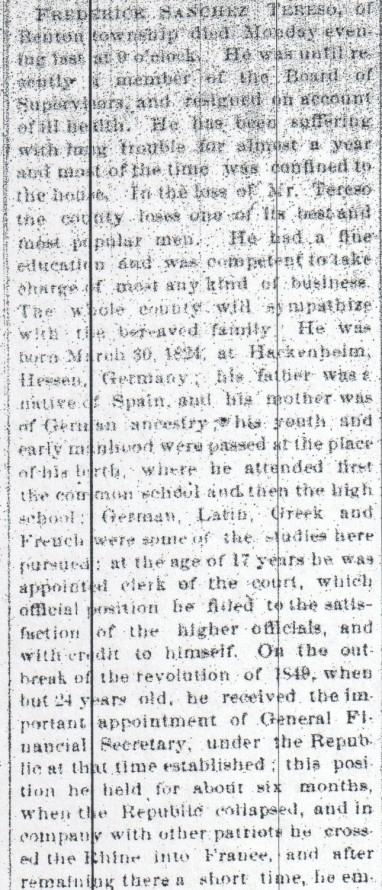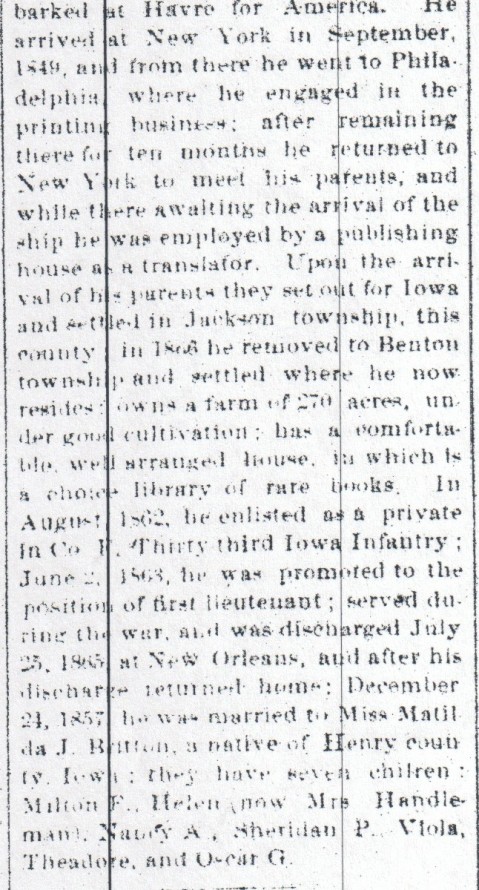I know that it’s not nice to play favorites. I have five kids and I always try to keep things pretty equal between them.
I really can’t help myself when it comes to my ancestors though. I play favorites and I’m not sure why. I think that maybe I tend to like the ones that I have more biographical information on. Names and dates aren’t all that exciting. Stories are.
Jacob Frederick Sanchez-Tereso, my great-great grandfather is definitely at the top of my “cool ancestors” list. He led such an interesting life. He spoke many languages, served in the military, and had a rare book collection. My kind of guy!
A little background info before I give you his obituary. Fred’s father was Nicanor (Nicholas)Gonzalo Sanchez-Tereso. He was born in Herencia, Spain and moved to Germany sometime around the Napoleonic Wars. He married Anna Marie Weber there and all of their children (Fred included) were born in Germany. I can’t wait to dive into some German research, because I have a feeling that the Sanchez-Tereso’s are going to stick out like a sore thumb there.
Another side note. His obituary is very detailed (Which is so wonderful! I wish everyone’s obits were so fact-filled) but I noticed that a portion of it was in present tense (as if he were still alive) and it sounded very familiar. I realized a portion of his obit is almost word for word from the biography included on him in the local county history. 🙂
Here is the obituary which I found at the KeoMah Genealogical Society’s library in Oskaloosa, Iowa. This was published in “The News” of Sigourney, Iowa, dated April 27, 1882, on page 3, row 3. (The town, by the way, is not pronounced like “Sigourney Weaver” – the emphasis is on the “Sig” instead. It was painful for me to hear this said over and over, especially since I had been mispronouncing the name of this town for about 10 years.)


Frederick Sanchez-Tereso, of Benton township died Monday evening last at 9 o’clock. He was until recently a member of the Board of Supervisors, and resigned on account of ill health. He has been suffering with lung trouble for almost a year and most of the time was confined to the house. In the loss of Mr. Tereso the county loses one of its best and most popular men. He had a fine education and was competent to take charge of most any kind of business. the whole county will sympathize with the bereaved family. He was born March 30, 1824, at Hackenheim, Hessen, Germany; his father was a native of Spain, and his mother was of German ancestry; his youth and early manhood were passed at the place of his birth, where he attended first the common school and then the high school; German, Latin, Greek and French were some of the studies here pursued; at the age of 17 years he was appointed clerk of the court, which official position he filled to the satisfaction of the higher officials, and with credit to himself. On the outbreak of the revolution of 1849, when but 24 years old, he received the important appointment of General Financial Secretary, under the Republic at that time established; this position he held for about six months, when the Republic collapsed, and in company with other patriots he crossed the Rhine into France, and after remaining there a short time, he embarked at Havre for America. He arrived at New York in September, 1849, and from there he went to Philadelphia, where he engaged in the printing business; after remaining there for ten months he returned to New York to meet his parents, and while there awaiting the arrival of the ship he was employed by a publishing house as a translator. Upon the arrival of his parents they set out for Iowa and settled in Jackson township, this county; in [I believe it says 1856] he removed to Benton township and settled where he resides, owns a farm of 270 acres, under good cultivation; has a comfortable, well arranged house, in which is a choice library of rare books. In August 1862, he enlisted as a private in Co. F Thirty-third Iowa Infantry; June 2, 1863, he was promoted to the position of first lieutenant; served during the war, and was discharged July 2, 1865 at New Orleans, and after his discharge returned home; December 24, 1857 he was married to Miss Matilda J. Britton, a native of Henry county, Iowa; they have seven children: Milton F., Helen (now Mrs. Handleman), Nancy A., Sheridan P., Viola, Theadore, and Oscar G.
Didn’t he lead an interesting life? He was definitely so much more than an Iowa farmer. I really need to brush up on my German history and read more about the revolution of 1849 so that I can understand his life a bit more. Do any of you have Germans that came to America during this time period? Did they do so for a similar reason?






